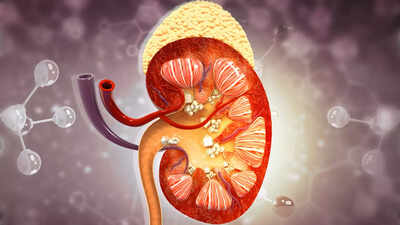ARTICLE AD BOX

Kidney stones, a common urinary problem affecting millions, can cause intense pain and serious complications if untreated. Key symptoms demanding immediate attention include severe pain in the back, belly, or side, difficulty or burning sensation during urination, and blood in the urine.
Kidney stones have emerged as one of the most common urinary system problems across the globe. About 1 in 10 people will get a kidney stone during their lifetime. These small but painful mineral deposits that form in the kidneys affect millions annually.
Though some of these stones pass painlessly while urinating, the larger ones get trapped and require immediate medical attention. If left untreated, it can lead to serious complications. Here are some of the signs and symptoms of kidney stones that require immediate attention.

Pain in the belly, back, or side
Kidney stones cause intense pain. This excruciating pain typically originates in the back or side, below the ribs, and may radiate to the lower abdomen or groin.
Kidney stone pain is also known as renal colic, which is one of the most severe types of pain. Sometimes, this pain may come in waves and fluctuate in intensity as the stone moves through the urinary tract. You should seek medical help immediately, because severe pain could indicate a stone blocking urine flow, which may damage the kidney.Burning sensation, or difficulty urinating

If you are struggling to urinate or experiencing a burning sensation, it is a crucial sign of a urinary tract issue. People with kidney stones often notice difficulty urinating, or a burning sensation while passing urine, and also changes in urine. These symptoms may indicate a stone obstructing the ureter or urethra, affecting the urine flow. A complete blockage can cause urine to back up into the kidney, potentially leading to permanent damage.
If urination becomes painful, infrequent, or stops entirely, seek immediate medical attention. Blood in urine
Hematuria, also known as blood in the urine, is a common symptom of kidney stones. Urine may appear pink, red, or brown, depending on the amount of blood. This is due to the stone irritating or damaging the urinary tract. This sign requires immediate attention. You should visit a doctor to rule out complications like infection or a larger stone obstructing the ureter.Fever and chills

A fever accompanied by chills, especially with other kidney stone symptoms, is a red flag. These signs could indicate an infection, such as pyelonephritis, which is caused by a stone blocking urine flow. This leads to the accumulation of bacteria. A fever above 100.4°F, particularly with nausea or pain, requires urgent medical attention. These signs should not be dismissed because if left untreated, urinary infections can lead to sepsis, a life-threatening condition.
King Charles’ Cancer CONFIRMED As ‘Incurable’? Royal Health Secret Finally Revealed | Shocking Update
Nausea and vomiting

Kidney stones can often trigger nausea and vomiting due to severe pain or a blockage affecting kidney function. If these symptoms are accompanied by intense pain episodes, you should be alerted. If nausea or vomiting prevents fluid intake or persists alongside other symptoms, immediate medical attention is required to prevent dehydration and to find out about obstructions or infections. Remember, early intervention can prevent complications and ensure proper treatment.
So, don't wait for these signs to worsen or intensify. NB: This information is based on internet research and is intended for general knowledge only. It should not be considered a substitute for professional medical advice.



.png)
.png)
.png)
















 1 day ago
6
1 day ago
6










 English (US) ·
English (US) ·